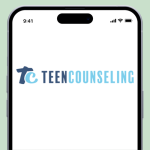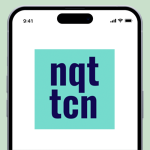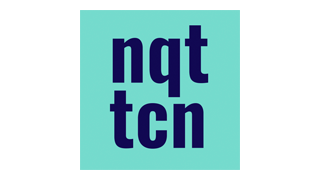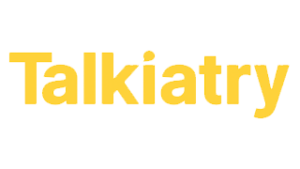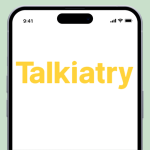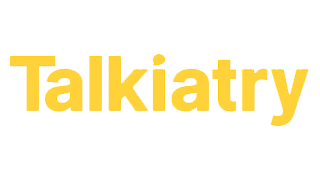Table of Contents
Methodology
- We researched over 70 online therapy platforms and signed up for and tested 20 of the most popular platforms.
- We analyze each of the tested platforms to find the ones that best serve people living with anxiety.
- We surveyed 1,200 online therapy users, held focus group interviews with users and therapists, and consulted with more than 60 mental health experts, including therapists who specialize in treating anxiety-related disorders.
- Collectively, we’ve spent more than 10,000 hours researching online therapy.
Learn more about how we test and choose online therapy platforms for anxiety.
Key takeaways
- BetterHelp is our top pick for online therapy platforms for anxiety due to our survey respondent’s high ratings of its therapists. We also like the bonus features that help with anxiety, like a digital journal and group therapy sessions.
- All of the online therapy platforms we recommend for anxiety offer cognitive behavioral therapy (CBT), an effective evidence-based treatment for anxiety.
- About 31 percent of Americans experience an anxiety disorder at some time in their lives. Online therapy is one option for treating anxiety-related disorders.
While experiencing anxiety at some point in your life is normal, it should be temporary. Most people encounter feelings of anxiety when stressed or in uncomfortable situations. But when you find your anxiety is persistent and interferes with your ability to enjoy and participate in daily life, it might be time to get help from a professional. In the United States, almost one-third of Americans experience an anxiety disorder at some point in their life.
Online therapy is one option to explore if you are experiencing symptoms of anxiety. To help you decide if online counseling is the right choice for your situation, we signed up for and tested 20 online therapy platforms. Read about our top seven picks for treating anxiety.
Our picks of the best online therapy for anxiety platforms
- BetterHelp: Best overall
- Brightside: Best for anxiety and depression
- Talkspace: Best for social anxiety
- Online-Therapy.com: Best CBT for anxiety
- Thriveworks: Best for choosing your provider
- TeenCounseling: Best for teens
- National Queer and Trans Therapists of Color Network: Best for queer and trans people of color
Our pick of the best online psychiatry for anxiety platform
- Talkiatry: Best for medication management
BetterHelp: Best overall
Why BetterHelp is our choice for best overall platform for anxiety
BetterHelp is our choice as the best overall online therapy platform for anxiety because of positive tester feedback and the high level of support users receive from therapists between sessions (via in-app messaging). We also like that its bonus features, like digital journal prompts and group therapy sessions, often focus on anxiety-related issues. On BetterHelp, you can search for a therapist who specializes in anxiety or be matched with a therapist based on your responses to a questionnaire that screens for anxiety and other mental health challenges.
Who may like BetterHelp: Those seeking multiple options for anxiety support, such as group and individual therapy, or different therapy approaches.
Who may want to avoid BetterHelp: Those looking for psychiatric support, such as a mental health diagnosis or medication management.
BetterHelp tester insights
Our tester signed up for BetterHelp and completed four weeks of therapy. They also went through the process of switching to a new provider. To get matched with a therapist, you will fill out a form asking what led you to therapy, how often you experience certain symptoms, and what you’re looking for in a therapist. The questionnaire, though brief, does a good job of screening for primary symptoms of anxiety, such as restlessness, loss of focus, and worried or anxious thoughts. If your answers indicate anxiety symptoms, you’ll be matched with a therapist who specializes in anxiety-related disorders.
At the time of testing, you can only search BetterHelp therapist profiles after requesting a switch to a new therapist. As of this writing, however, it’s possible to start your BetterHelp journey by searching BetterHelp therapist profiles. Each profile is tagged with the conditions treated (such as stress/anxiety, depression, or grief). Reading therapist profiles lets you learn more about each therapist, including their treatment approach. We think it’s great that BetterHelp users can now choose to be matched with a therapist or choose their own. It’s worth noting, though, that platforms like Thriveworks and ZocDoc have more robust directories that allow users to filter for therapeutic approach, gender, language spoken, and more.
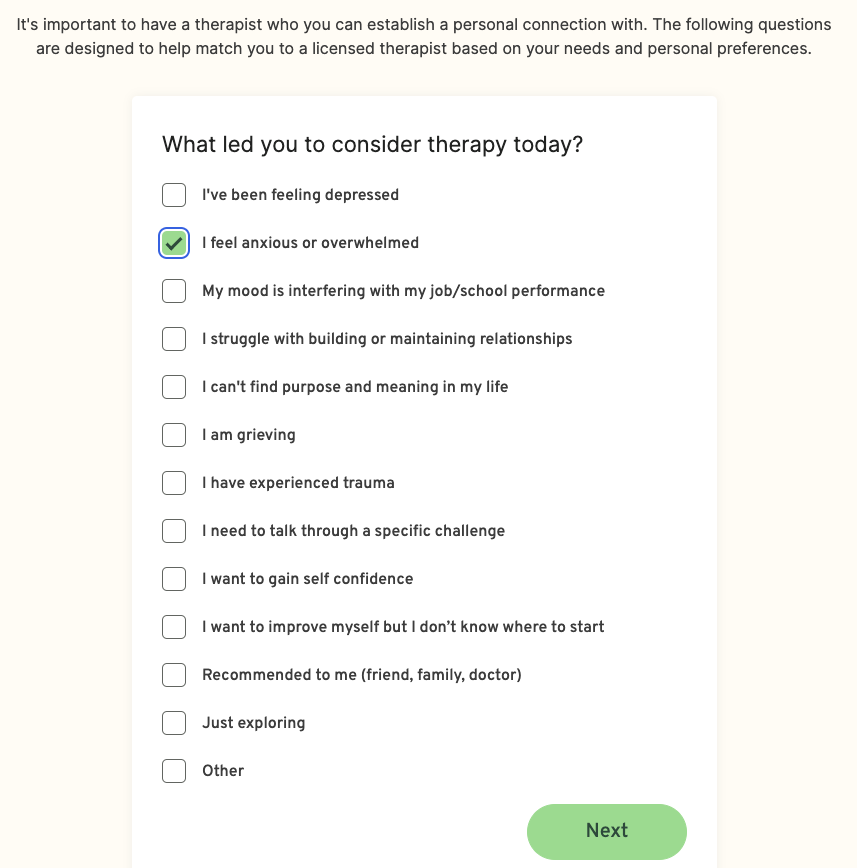
We also like BetterHelp for its additional features that could potentially benefit people experiencing anxiety symptoms. These features include:
- The ability to switch therapists anytime if the provider you’re matched with is not a great fit. Our tester shares that switching therapists is easy—simply head to your settings and click “change therapist.”
- In-app messaging with all subscriptions, so you can reach out to your therapist at any time.
- Financial aid for people experiencing financial difficulties. Our tester found out they qualify for the benefit after completing a brief application.
- Group sessions that may be beneficial for people with anxiety-related mental health challenges. At the time of testing, group sessions included Dealing with Trauma Triggers, BIPOC Mental Wellness Women’s Support Group, Building Resiliency and Self-Care Practices During the Holidays, and several others. Our tester felt supported and understood in the group session they attended.
For more information, read our full BetterHelp online therapy review.
What other BetterHelp users are saying
In our October 2023 survey of 600 online therapy users, BetterHelp was the most popular platform among our respondents. In our February 2024 survey of 100 BetterHelp users, 87 percent somewhat or completely agreed that their therapist created a welcoming environment. Eighty-eight percent said the therapy they received on BetterHelp met their expectations.
Brightside: Best for depression and anxiety
Why Brightside is our pick for treating depression and anxiety
Anxiety and depression often go hand-in-hand. These two conditions result from the same biological vulnerability and can share some common symptoms. Research shows that as many as 50 percent of people with major depressive disorders may also experience an anxiety disorder. Brightside is our choice for online therapy to treat depression and anxiety because users can access talk therapy, online psychiatry, and medication management (if needed) on a single platform. Brightside also offers self-guided lessons on topics relevant to people seeking treatment for anxiety, like self-care and mindfulness.
Who may like Brightside: People looking for therapy, psychiatry, and medication management all in one place.
Who may want to avoid Brightside: Anyone who wants to choose their own provider.
Brightside tester insights
Brightside’s sign-up process is simple and easy. The onboarding process asks you to identify the condition you’re seeking treatment for, with anxiety and depression at the top of the list. Selecting “anxiety” will lead you to a series of questions about your level of worry and other anxiety-related symptoms, such as restlessness, trouble sleeping, and feelings of dread. The platform uses these responses to match you with a therapist.
If you don’t like the therapist you’re matched with, our tester shares that switching therapists is easy. After deciding to switch to a new provider, they promptly received an email with profiles of seven other therapists. “I really appreciated that they were so helpful and that I was able to choose who I would be working with,” they say.
In addition to the live video sessions with their therapist, our tester appreciates how easy it is to use the Brightside app. They love the app’s bonus features, including the interactive video lessons and progress monitoring. “I love the short videos you can do in between sessions to work on managing anxiety and stress,” they say.
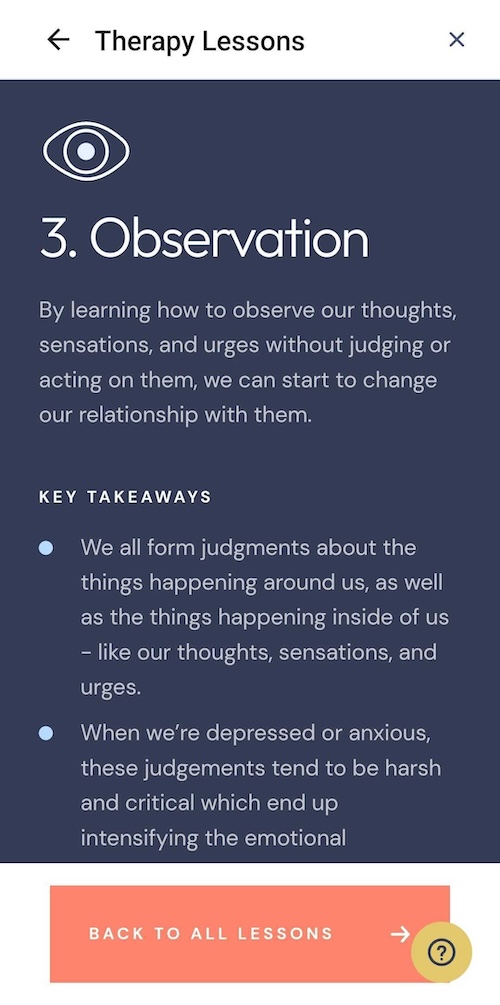
They also note that they were asked to take assessments multiple times to track their progress. These assessments “mostly seem to be tracking how anxious or depressed you are so they can gauge those symptoms over time,” they say. According to the American Psychological Association, measuring your progress is an empowering practice that can help improve your mental health. This practice can also help increase your engagement with the therapeutic process, helping you get more out of your therapy sessions.
For more information, read our full Brightside review.
What other Brightside users are saying
Compared to the national average of 48 days to see a mental health care provider, Brightside offers shorter wait times. Respondents from our October 2023 survey of 600 online therapy users reported that Brightside wait times are as short as 24 hours or less, and 86 percent of users waited less than two weeks for an initial appointment.
Talkspace: Best for social anxiety
Why we choose Talkspace as the best platform for social anxiety
Talkspace is our choice for online treatment of social anxiety because it offers screening and therapist matching specifically for this issue. We also like that Talkspace serves both teens and adults, accepts insurance, and offers upfront cost transparency for people paying out of pocket.
Who may like Talkspace: Anyone looking for therapy, psychiatry, and medication management for social anxiety.
Who may want to avoid Talkspace: Medicaid recipients or those needing financial aid.
Talkspace tester insights
We like that Talkspace offers a social anxiety test to help you identify symptoms of social anxiety disorder and matches you with a therapist accordingly.
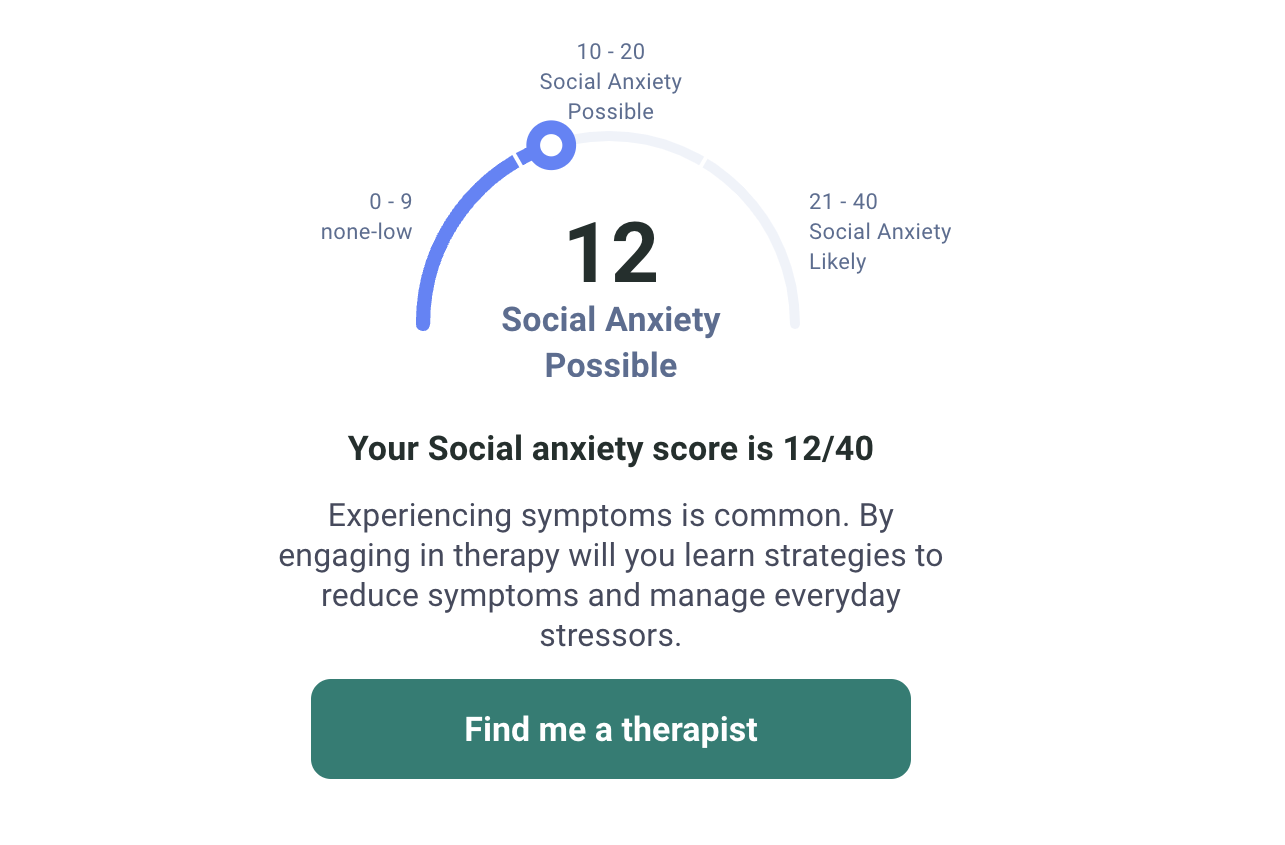
If you don’t feel a connection to the therapist you’re matched with, it’s easy and free to switch providers. Our tester changed providers right away because the therapist she initially matched with wasn’t available at convenient times. When switching to a new provider, they found two similarly qualified therapists and made their final decision using the platform’s availability graph, a tool that shows days and times when each therapist is available.
All Talkspace plans include the ability to message your therapist at any time. Though most experts we’ve spoken to agree that text messaging a therapist is not a replacement for one-to-one therapy, it can be a useful addition to your therapy sessions. In the case of social anxiety and other anxiety-related disorders, regular texts from your therapist may be useful reminders to employ strategies discussed during sessions. One study showed that text message reminders helped people with social anxiety to reduce safety behaviors Behaviors or habits a person believes can prevent or minimize a negative outcome or stressful situation, like public embarrassment. These can include avoiding eye contact or rehearsing sentences before speaking out loud. , such as avoiding eye contact and mentally rehearsing before speaking.
For our tester, regular text message check-ins with their therapist help track their mood and progress. They note, though, that responsiveness varies by therapist. “Some therapists don’t use the messaging feature to prompt me every day,” they say, “Whereas other therapists give a lot of good resources and reflection prompts regularly.” If responsive messaging matters to you, let your therapist know your preference right away.
Live workshops—similar to group therapy sessions—are another helpful feature of the Talkspace platform. A licensed mental health professional leads each workshop, and many of the topics address anxiety-related issues. At the time of writing, workshop topics include “Managing Your Anxiety,” “Understanding Your Triggers,” and “Making Mindfulness Easy.”
For more information on this platform’s offerings, read our full Talkspace review.
What other Talkspace users are saying
In our November 2023 survey, 36 percent of Talkspace users chose live chat as their favorite way to communicate with their therapist. Keep in mind, though, the Talkspace messaging therapy plan is asynchronous, meaning that you are not communicating in real-time with your provider. You will have 24/7 access to your private therapy room, though, so you can share your thoughts and feelings at any time, and your provider will respond once they’ve read your message.
Online-Therapy.com: Best CBT for Anxiety
Why we choose Online-Therapy.com as the best CBT for anxiety
Online-Therapy.com is our choice for the best online CBT for anxiety because all its therapists are CBT-trained. The Handbook Team also likes that the additional features included in memberships—a digital journal, worksheets, and virtual yoga classes—are CBT-informed tools that can help people seeking treatment for anxiety.
Who may like Online-Therapy.com: Anyone looking for a CBT-based program with trained therapists.
Who may want to avoid Online-Therapy.com: Those seeking medication management or who wish to use insurance.
Online-Therapy.com tester insights
Online-Therapy.com exclusively offers CBT, a treatment approach that helps people identify unhelpful patterns of thinking or behavior and teaches concrete coping strategies for developing more helpful behaviors and thought patterns. CBT is widely accepted as one of the best evidence-based treatment approaches for anxiety and anxiety-related disorders.
In addition to one-on-one therapy sessions, Online-Therapy.com offers an eight-section self-guided CBT program, including readings, journal prompts, yoga and meditation videos, symptom trackers, and self-assessments. Our tester appreciates the many tools offered by the platform but notes that their therapist hasn’t fully utilized those extra tools or brought them up in therapy sessions. For a more integrated experience, users may want to ask their therapist to incorporate the guided lessons into therapy sessions.
Erin Bircher, a licensed professional counselor and clinical addictions specialist, has recommended several CBT-informed tools to her clients throughout the years, including journaling and mood tracking. But for people seeking treatment for anxiety, she emphasizes the importance of using such tools in collaboration with a mental health professional. “It’s important to make sure you are using the tools correctly and that you are using the correct tool for you,” she says. For people seeking anxiety treatment through Online-Therapy.com, we recommend asking your therapist which tools would be best for your particular situation.
Mood trackers are great to help gain a baseline and a starting point, and journals are wonderful for helping people process things they are trying to work through.
Erin Bircher, LPC, LCAS, and founder of Foundations4Change.
Learn more in our Online-Therapy.com review.
What other Online-Therapy.com users are saying
Our tester had a hard time finding a therapist who was available in their area at the times they needed. Still, 84 percent of Online-Therapy.com users in our October 2023 survey report waiting less than two weeks for their initial appointment. In our February 2024 survey of 100 Online-Therapy.com users, 84 percent of respondents say that their initial therapist met their needs and preferences, and 88 percent say the therapy they received on the platform met their expectations.
Thriveworks: Best for choosing your provider
Why we choose Thriveworks as the best platform for choosing our own provider
Because Thriveworks allows you to filter by specialty and type of therapeutic approach, they earn our top pick for choosing your provider. You can use this platform to find a therapist or psychiatrist who takes your insurance and specializes in treating anxiety.
Who may like Thriveworks: Those who want to evaluate provider profiles and choose their own therapist.
Who may want to avoid Thriveworks: Budget-conscious readers or those in areas with limited options for therapists.
Thriveworks tester insights
For people seeking treatment for anxiety, it may be empowering to choose your therapist rather than being matched with one by the platform. Thriveworks has several filtering options to help you choose the kind of provider you want, including clinician gender, language spoken, and type of visit (virtual or in-person). We especially like that you can filter by what you want help for, with options including anxiety, trauma/PTSD, ADHD, stress, and more.
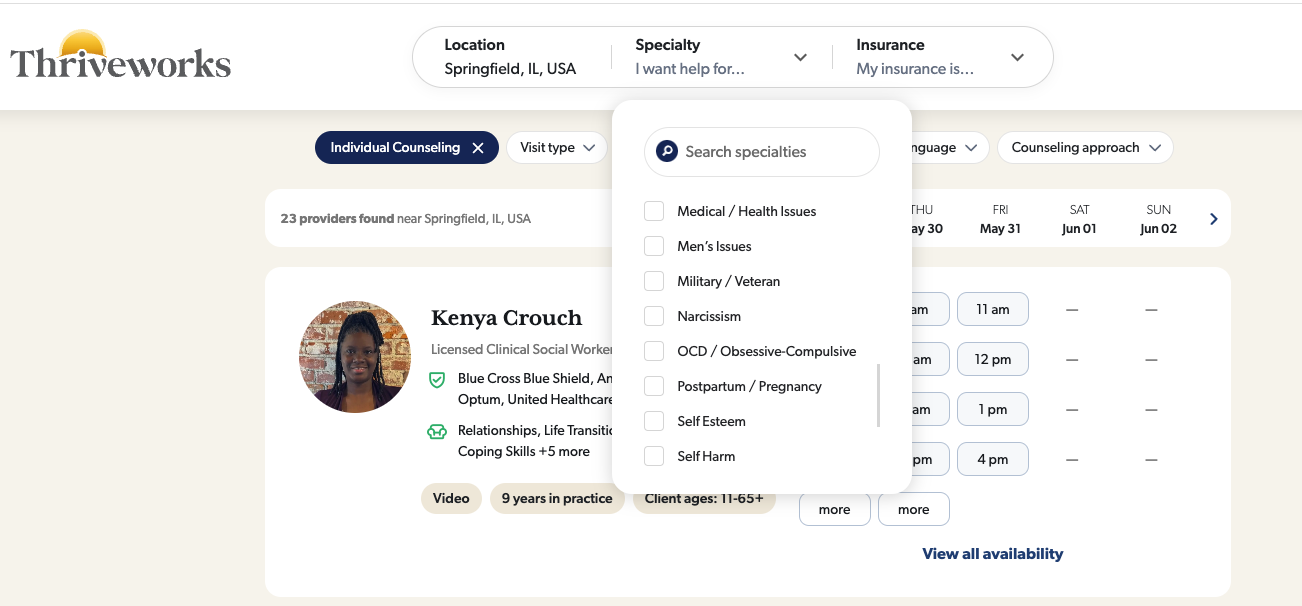
Thriveworks providers work with hundreds of insurance carriers, including Medicare and some Medicaid locations. To find an in-network provider, enter your location, what condition you’re seeking help for, and your insurance carrier.
We like that each Thriveworks profile is tagged with the provider’s preferred pronouns, years in practice, and the ages they serve. By clicking on each provider’s profile, you can see the type of insurance they accept and their upcoming available appointments. Our tester appreciates the detailed biography in each profile and likes that each provider answers questions like “Why did you become a counselor?” or “What types of clients are you most excited to work with?” You can book your session from their profile page when you find a provider that resonates with you.
Our tester chose their therapist based on the specialties listed and what they thought would be the best match. “I like that we discussed strategies and dug deeper into graphs, visuals, and ways to implement healthy habits in day-to-day life,” they say of their therapist. “She was very prepared with resources and stimuli to spark a productive conversation.”
Our Thriveworks review gives more insights into our testing experience.
What other Thriveworks users are saying
Thriveworks provider availability varies by location. Here are a few of our Thriveworks provider search results:
- Total Springfield, Illinois providers who treat anxiety and accept Blue Cross Blue Shield of Illinois HMO: 22.
- Total Eugene, Oregon providers who treat anxiety and accept Aetna: 2.
- Total Raleigh, North Carolina providers who treat anxiety and accept Cigna: 59.
- Total Tallahassee, Florida providers who treat anxiety and accept Medicare: 34.
TeenCounseling: Best for teens
Why we choose TeenCounseling as the best online anxiety therapy for teens
TeenCounseling by BetterHelp gets high marks for the ease with which families can sign up for and start therapy. We chose it as the best online therapy for teens experiencing anxiety because our testers say it does a good job of matching teens to therapists who meet their specific needs. We also like that both teens and parents can message the therapist at any time.
Who may like TeenCounseling: Teens who want to communicate with their provider in various ways.
Who may want to avoid TeenCounseling: Teens who want to choose their therapist or require medication management.
TeenCounseling tester insights
It can be scary to witness anxiety in your children or teens. Rates of anxiety and depression in youth doubled during the COVID-19 pandemic, and many teens are still trying to manage those symptoms. While some teens may need or prefer in-person counseling, online therapy has the benefit of fitting into teen’s busy schedules. A lot of teens find that the most helpful aspect of online therapy is that it saves time. You don’t have to rush to drive to the doctor’s office.
If you decide online therapy is right for your teen, TeenCounseling offers the benefit of getting started quickly. Setting up your account takes just a few minutes. The intake assessment asks you about your teen’s symptoms, including panic attacks, trouble sleeping, worried thoughts, difficulty concentrating, or angry outbursts. Your answers to these questions will help the platform connect you with a therapist. Once you’re matched with a therapist, you can connect your child to the app so that they can also communicate with their therapist and attend sessions on their computer or mobile device. Our tester likes that they and their teen can both message the therapist privately. They also share that booking appointments through the app is very convenient.
Both of the therapists our tester’s teen matched with had experience that matched their teen’s needs, but the first therapist only had weeknight availability, so they switched to a therapist with weekend and weekday afternoon availability. “The second therapist is even more qualified than the first,” our tester says. “Her experience fits with the issues my teen is facing.”
During the first session, our tester experienced technical difficulties that made it impossible to attend a video session. Instead, the appointment was switched to an audio format. The therapist commented that disruptions to video sessions are frequent, which is one frustrating aspect of this platform.
In between sessions, teens can complete worksheets provided by the therapist or write in the TeenCounseling app’s digital journal. Daily prompts are provided, and many of them are specific to the teen’s symptoms.
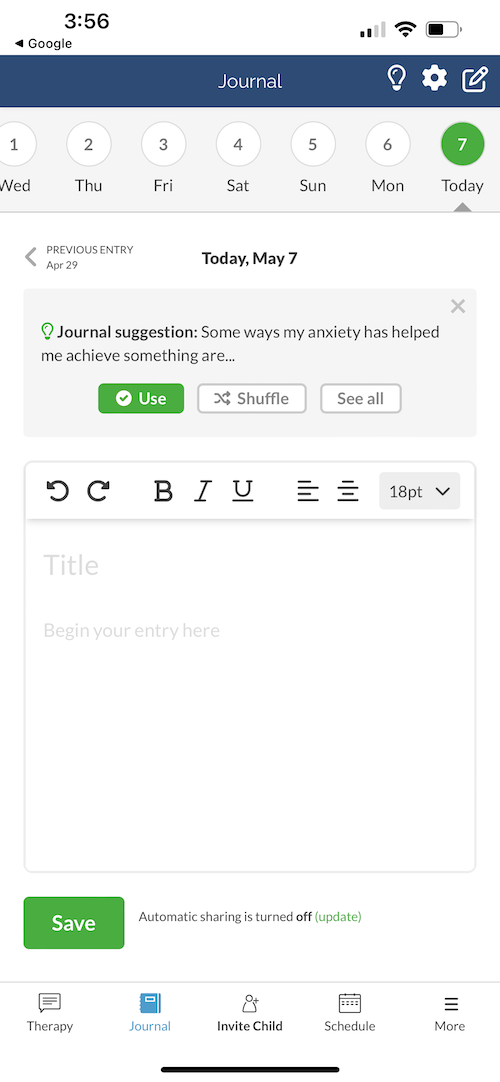
Learn more in our TeenCounseling review.
What other TeenCounseling users are saying
In our February 2024 survey of 100 parents with children who used the TeenCounseling platform, 82 percent felt the therapist provided a safe space for their teen, and 73 percent felt their therapist adapted their therapeutic style to meet their teen’s needs. Seventy-seven percent saw a reduction in the symptoms that led their teen to therapy in the first place.
National Queer and Trans Therapists of Color Network: Best for queer and trans people of color
Why we choose the National Queer and Trans Therapists of Color Network as the best for queer and trans people of color
We love that NQTTCN is dedicated to providing and transforming mental health care for queer and trans people of color. You can search for providers in your area and read detailed provider bios to find out if a provider treats anxiety.
Who may like National Queer and Trans Therapists of Color Network: Queer, trans, Black, Indigenous, and other people of color who would like to choose a provider who matches their needs.
Who may want to avoid National Queer and Trans Therapists of Color Network: Anyone wanting a straightforward billing and scheduling system.
NQTTCN tester insights
The National Queer and Trans Therapists of Color Network (NQTTCN) is a 501(c)3 (not-for-profit) organization dedicated to healing justice, which they define as a spiritual-political framework for healing generational trauma by addressing structural racism and oppression. This is a helpful directory for anyone who self-identifies as a queer or trans person of color and wants to work with a therapist who also identifies as such. In a culture where research suggests that racism (and othering) can increase anxiety-related disorders, it is important for people to find care that acknowledges and addresses how anxiety can be related to identity.
The NQTTCN directory is growing but is still pretty sparse in some parts of the country. Currently, the directory can connect you with providers in 30 states and two Canadian provinces. The availability of providers varies greatly by location. The Handbook Team’s search turned up 78 providers in New York and 151 providers in California, but the directory only returned one result for Nevada and three for Alabama. While some provider bios are more detailed than others, all of the ones we read indicate the therapist’s areas of specialty, so it’s easy to find out if a provider has experience with anxiety and anxiety-related disorders. Most providers also share their therapeutic approach, such as CBT or DBT.
We like that per-session fees are shared on each provider’s profile, including which insurance plans they accept. It’s a bonus that many providers on this platform accept sliding scale fees.
Learn more in our NQTTCN review.
What other NQTTCN users are saying
One key feature of the NQTTCN is its Mental Health Fund (MHF), which provides financial support for up to eight sessions with a licensed therapist (offering $125 per session to the therapist). The funds are available to queer and trans people of color in need of financial support who are 18 years or older. In order to benefit from the funds, a person must find a therapist who participates in the MHF program, and the therapist must write a letter agreeing to participate. Resources must be used towards self-pay therapy, not insurance copays.
If you need prescription medication for anxiety
Talkiatry: Best for medication management
Why we choose Talkiatry as the best platform for medication management
Talkiatry is our top pick for medication management because it offers access to a psychiatrist in as little as one day. Our tester likes that they can message their provider anytime with questions or concerns.
Who may like Talkiatry: Those who want to connect with a therapist quickly and who plan to use insurance for online therapy or psychiatry.
Who may want to avoid Talkiatry: Anyone without insurance and those in uncovered states.
Talkiatry tester insights
Cognitive behavioral therapy, either in-person or online, is considered a front-line treatment for anxiety and anxiety-related disorders. Research suggests that for some people, medication—ideally in combination with talk therapy—can also be effective in treating general anxiety disorder (GAD) and other anxiety-related disorders. If you’re considering medication for your anxiety and want to talk to a specialist, Talkiatry offers a quick and affordable means of treatment.
To get started with Talkiatry, you’ll complete the following steps:
- Enter your location and insurance information (the platform takes over sixty insurance plans, including Medicare and Medicaid). Talkiatry will let you know right away if you’re covered.
- Set up an account by entering your email address and clicking the link in your email. You’ll be prompted to add more personal details, including your address and birth date.
- Answer a series of clinical questions about your symptoms and previous care.
- Based on your answers, Talkiatry will match you with a provider who meets your needs.
The entire sign-up process takes just a few minutes. Our tester shares that they couldn’t browse psychiatrists or view any information about the psychiatrist they were matched with. Still, they report that each psychiatrist they met with—a total of three—was specialized to their specific needs and willing to help. “I never had the issue of us not being a good fit,” they say.
Talkiatry psychiatrists can prescribe several medications used to treat anxiety, including selective serotonin reuptake inhibitors (SSRIs), like Paxil and Zoloft, and serotonin-norepinephrine reuptake inhibitors (SNRIs), like Effexor and Cymbalta. Depending on the state laws where you live, you can also receive a prescription for controlled substances, such as benzodiazepines (Xanax, Ativan, Klonopin), which are sometimes used to treat anxiety. Before prescribing any medication, your provider will complete a thorough evaluation—usually 60–75 minutes—to determine which medications, if any, are appropriate for your situation. Regular check-ins with your psychiatrist are always available through the Talkiatry platform. To fill and refill your prescription, ask your Talkiatry clinician to send it to your local pharmacy. You’ll pay for your prescription at the pharmacy.
You can access Talkiatry through the Healow app, which will allow you to access your medical records, see lab results, and manage all of your Talkiatry appointments and medications.
For more information, read our full Talkiatry online psychiatry review.
What other Talkiatry users are saying
In the Handbook Team’s February 2024 survey of 100 Talkiatry users, 84 percent had a treatment plan involving medication. Regarding provider satisfaction, 91 percent of users report having positive interactions with their psychiatrist, and 80 percent saw a reduction of symptoms that led them to see a psychiatrist in the first place.
Other online therapy platforms to consider for anxiety
We tested several other online therapy platforms to find the best options for treating anxiety. Though they didn’t make it into our top seven recommendations, these platforms may be a good fit for your needs.
Amwell
Amwell offers a variety of online health services, including therapy and psychiatry. The mental health providers on Amwell treat a variety of anxiety-related disorders, including OCD, panic attacks, and social anxiety. The stand-out feature on this platform is the ability to choose your therapist based on your needs. We also like that your therapist can connect you with a psychiatrist on the platform if you decide you want to try medication for anxiety.
For self-pay users, Amwell therapy is $109 per session, and psychiatry is $279 for an initial consult and $109 per session for 15-minute follow-ups. Amwell also accepts several large insurance carriers.
Learn more in our Amwell review.
Sesame
Like Thriveworks, Sesame offers a wide selection of providers, and it’s possible to search Sesame for providers who specialize in treating anxiety. Sesame has a pay-per-session structure. We like the upfront cost transparency, especially for people who need to stick to a budget and can’t afford a monthly subscription.
Our tester found therapy sessions as low as $32 per visit and psychiatry consults for as low as $51. Pricing varies widely by provider, and you’re not guaranteed to find a low rate in your area. Still, if you need mental health care without the stress of a monthly financial commitment, Sesame might be a good fit.
To learn more, read our Sesame review.
How we test and choose the best online therapy for anxiety services
Our firsthand user experience
The Handbook Team has spent 10,000 hours researching more than 70 online therapy and psychiatry platforms, directories, and networks. We signed up for and tested the top 20 platforms. Our testers engage with each platform for two to four weeks.
In addition to attending live video sessions, our testers evaluate several key features of each platform, including switching providers, using insurance, booking and paying for appointments, and contacting customer service. We also ask testers to explore bonus features offered by each platform, such as digital journals, worksheets, and group sessions.
For their privacy, we can’t ask testers to share information about their diagnoses or the issues they choose to address in sessions. However, we ask them to gather data about how platforms treat specific conditions, such as anxiety and depression. For example, some of the platforms we test specialize in cognitive behavioral therapy, a frontline treatment for anxiety-related disorders. Others allow you to search for providers who specialize in treating specific anxiety-related conditions, like OCD or social anxiety.
User surveys and focus groups
Surveys: The Handbook Team has surveyed 2,000 online therapy users to better understand their reasons for seeking online therapy and the quality of their experience. We learned that the majority of users seek online therapy to work through a specific issue, situation, or life event or to manage a diagnosed mental health condition.
Focus groups: The Handbook Team conducts focus groups with online therapy users to discuss specific aspects of the online therapy experience, including privacy issues, affordability, and overall impact. Our focus group participants include veterans, parents, students, and people from a variety of cultural backgrounds.
Expert insights
We consult with mental health experts to understand the online therapy landscape and ensure we recommend quality platforms. For this article, we consulted a licensed clinical social worker (LCSW) who specializes in treating anxiety and a behavioral health specialist who is also the founder of a clinical practice. Every article we write is medically reviewed by one of our trusted experts and advisers.
Our online therapy rating indexes
Based on our in-depth research, testing, and user survey results, we create indexes to rate each online therapy platform. Our indexes weigh each of the following criteria:
Affordability
We review the cost of ongoing weekly live therapy sessions with each platform. We look at the total price, whether platforms accept insurance or offer financial assistance, and features that add value, like digital journals, group sessions, and online workshops.
For platforms that offer psychiatry and medication management, we compare the cost of therapy to the cost of psychiatry. We also consider the cost of prescription medications. For example, some people may choose to treat anxiety with SSRIs or benzodiazepines.
Data privacy
We examine each platform’s data privacy policy and compare how frequently they update the policy and if it clearly explains how the platform handles your data. We also look for specific data processing standards like HITRUST certification, if the platform asks for consent to collect your data, and whether or not platforms encrypt your data.
Availability
We compare online therapy platforms by the total number of therapists in their network and the number of states they operate in. We also research each platform’s availability in five states that rank lowest in mental health coverage and access. We then investigate brands for data on their customer service, intake process, therapist switching, and more.
Inclusivity
We compare each platform to learn if they are inclusive for all users and if they offer a diverse selection of therapists. We surveyed 100 users of 10 different platforms to learn what mattered to them regarding identity and inclusion and how they rated their platform on these factors. We review each brand on their therapist choices, therapist diversity, inclusivity signals, and if users feel that they receive care that speaks to and values their identity.
Read more about our rating indexes and how the scores are determined in our methodology.
Pros and cons of online therapy for anxiety
Online therapy can be a great option for people with symptoms of anxiety or an anxiety-related disorder, but it’s not the best choice for everyone. Before deciding if online therapy is right for you, consider the following benefits and drawbacks:
Pros
- Affordability: Online therapy eliminates transportation costs like gas and parking fees.
- Convenience: Live video sessions at home may be easier to fit into your schedule than in-person visits.
- Expanded Range: For people in remote areas, online therapy platforms expand the pool of therapists with available services.
- Privacy: In our October 2023 survey of 600 online therapy users, 50 percent of respondents preferred online therapy to in-person therapy because they felt more comfortable in their own homes.
- Efficacy: Studies show online therapy is an effective treatment for generalized anxiety disorder (GAD).
Cons
- Efficacy: Some therapies for anxiety, like exposure therapy, may be more effective in person.
- Personal connection: Some people find it harder to emotionally connect with their therapist through a screen.
- Quality of providers: Online platforms may put you at a higher risk of ending up with an unqualified provider. Check your provider’s qualifications carefully.
- Quality of sessions: Technical difficulties, such as a poor internet connection, may interrupt online therapy sessions.
Types of therapy used to treat anxiety
You can’t completely eliminate anxiety from your life, but most experts agree that anxiety-related disorders are highly treatable. The following types of therapy are effective in treating anxiety:
- Cognitive behavioral therapy (CBT) is a form of talk therapy that helps patients become aware of and change negative thinking patterns and behaviors. Bircher shares that “helping individuals understand how their thoughts and feelings are connected to their reactions and behaviors is extremely important when working on challenging and changing distorted thought patterns.”
- Dialectical behavioral therapy (DBT) is a form of talk therapy that helps people who experience intense emotions understand how their thoughts affect their emotions and behaviors.
- Acceptance and commitment therapy (ACT) is a therapeutic approach that encourages patients to acknowledge and accept their thoughts and emotions rather than trying to avoid or deny them. This mindful approach is often used to treat symptoms of anxiety.
- Exposure therapy is a psychological approach to helping people face their fears and anxieties. This has been shown to be helpful for phobias, panic disorders, and obsessive-compulsive disorder.
How to know if you need therapy for anxiety
In stressful times, feeling anxious is sometimes unavoidable. But if feelings of anxiety and worry become constant and interfere with your ability to work or enjoy life, it might be time to consider therapy.
“Therapy can help you learn about why you have anxiety, how anxiety affects us, and identify your triggers,” says Colleen Marshall, LMFT and founder of Two Chairs. “It can also help you learn and practice skills to manage the anxiety when it does occur. If you are noticing that your worry, fear, or anxiety is affecting your activities of daily living, it is a good idea to talk with a therapist.”
Tips for managing anxiety outside of treatment
Whether or not you choose to attend therapy, it’s helpful to know strategies that can help when you feel anxious. The experts we spoke to for this article recommend the following strategies for managing symptoms of anxiety outside of treatment:
- Get plenty of exercise.
- Stay connected to friends and family.
- Practice sleep hygiene to help you get a full night’s sleep.
- Practice relaxation techniques such as yoga, meditation, or deep breathing.
- Focus on aspects of your life that bring you a sense of gratitude, joy, or peace.
- Engage in a pastime you enjoy, like adult coloring books, painting, cooking, or spending time in nature.
How to choose an online therapy provider for anxiety
If you think online therapy might be right for you, be mindful of the following factors:
- When answering questions in an online therapy platform’s intake assessment, be honest about your feelings and symptoms. These assessments are the tools platforms use to match you with someone who meets your needs.
- Be discerning. If you choose a platform that allows you to choose your own therapist, look for their years of experience, the conditions they treat, and their therapeutic approach.
- Your connection to your therapist matters. If you are matched with a therapist through an online therapy platform but don’t feel a connection, ask to switch providers.
- Consider your budget. Find platforms that can accommodate your financial needs. If you have health insurance coverage, look for virtual therapy that accepts insurance.
Online therapists may not be the most appropriate resource to help in a mental health crisis. If you or someone you know is a danger to themselves or others around them, it’s an emergency that can’t wait for an online therapist’s response.
Don’t wait. You can find help immediately by:
- Calling 911
- Visiting an emergency room
- Visiting urgent care
- Calling or texting 988 for the Suicide & Crisis Lifeline
- Chatting online at 988lifeline.org
- Calling the Substance Abuse and Mental Health Services Administration (SAMHSA) Helpline at 1-800-662-4357 or texting your zip code to 435748
- Calling the National Sexual Assault Hotline at 1-800-656-4673 or chatting online
All the above options will connect you with trained professionals who can provide crisis support. You can find even more resources, including international options, on our helpline directory page.
Our final verdict
Our overall pick for the best online therapy for anxiety is BetterHelp because it performs so well with our testers and in our surveys. Testers and respondents give high marks for therapist quality and the platform’s ease of use. The intake process does a good job of matching users with symptoms of anxiety to a provider who can help, and if you don’t like your first therapist, it’s easy to switch. Many of BetterHelp’s bonus features—like digital journal prompts and group sessions—focus on anxiety-related topics.
The platforms we recommend for anxiety can provide access to therapists and, in some cases, psychiatrists with experience treating anxiety and anxiety-related disorders. While therapist availability may vary by geographic area, one benefit of online therapy platforms is their ability to expand the pool of providers you can access.
Online therapy platforms aren’t for people in crisis. If you’re experiencing overwhelming anxiety or have thoughts of harming yourself or others, go to your nearest emergency room or call 988 for the National Suicide & Crisis Hotline.
Compare the best online therapy and psychiatry for anxiety platforms of 2024
| Services | Individual therapy | Individual therapy for adults; Psychiatry | Individual therapy; Couples therapy; Teen therapy; Psychiatry | Individual therapy; Couples therapy | Individual therapy; Couples therapy; Child and teen therapy; Psychiatry | Individual therapy for teens | Individual therapy | Psychiatry |
| Ways to connect | Messaging; Text, audio, or video sessions | Messaging; Video sessions | Messaging; Text, audio, or video sessions | Messaging; Text, audio, or video sessions | Video sessions or in-person | Video or audio sessions; Messaging | Video sessions or in-person | Messaging; video sessions |
| Monthly cost (individual therapy) | $260–$360 | $299–$349 | $276–$436 | $200–$440 | Varies by provider | $260–$360 | $65–$250 per session, or the cost of your copay | Insurance only; $30 average copay |
| Takes insurance? | No | Yes, including major carriers like Aetna and Cigna | Yes, including major carriers like Aetna and BlueCross BlueShield | No | Yes | No | Yes | Yes |
Frequently asked questions
In many cases, it can help with symptoms of anxiety, but it depends on the individual and the provider. Research shows that online therapy can be equally effective as in-person therapy in treating anxiety and related disorders.
Certain online therapy platforms with licensed psychiatrists, like Brightside and Talkspace, can offer diagnoses, prescriptions, and medication management. Some, but not all, online therapy platforms can prescribe controlled substances like Xanax or Adderall. This will also depend on the state laws where you live regarding controlled substances and telehealth prescriptions.
If you prefer the comfort of your own home to an office setting, it might be worth trying online therapy for anxiety. Just make sure you find a provider you connect with, even if that means switching therapists until you find the right one.
- Any anxiety disorder. (n.d.). National Institute of Mental Health (NIMH). Link
- Measurement-based care is giving psychologists and their patients a better picture of treatment progress. (n.d.). https://www.apa.org. Link
- National Council for Mental Wellbeing. (2021, May 25). Certified community Behavioral health clinics providing expanded access to mental health, substance use care during COVID-19 pandemic – National Council for Mental Wellbeing. Link
- Text message safety behavior reduction for social anxiety: A randomized controlled trial. (n.d.). Link
- Carpenter, J. K., Andrews, L. A., Witcraft, S. M., Powers, M. B., Smits, J. a. J., & Hofmann, S. G. (2018). Cognitive behavioral therapy for anxiety and related disorders: A meta‐analysis of randomized placebo‐controlled trials. Depression and Anxiety, 35(6), 502–514. Link
- Bandelow, B., Michaelis, S., & Wedekind, D. (2017). Treatment of anxiety disorders. Dialogues in Clinical Neuroscience, 19(2), 93–107. Link
- Racine, N., McArthur, B. A., Cooke, J. E., Eirich, R., Zhu, J., & Madigan, S. (2021). Global prevalence of depressive and anxiety symptoms in children and adolescents during COVID-19. JAMA Pediatrics, 175(11), 1142-1150. Link
- MacIntyre, M. M., Zare, M., & Williams, M. T. (2023). Anxiety-Related Disorders in the context of racism. Current Psychiatry Reports/Current Psychiatry Reports, 25(2), 31–43 Link
- Eilert, N., Enrique, A., Wogan, R., Mooney, O., Timulak, L., & Richards, D. (2020). The effectiveness of Internet‐delivered treatment for generalized anxiety disorder: An updated systematic review and meta‐analysis. Depression and Anxiety, 38(2), 196–219. Link
- What is exposure therapy? (2017, July 31). https://www.apa.org. Link
- Carlbring, P., Andersson, G., Cuijpers, P., Riper, H., & Hedman-Lagerlöf, E. (2017). Internet-based vs. face-to-face cognitive behavior therapy for psychiatric and somatic disorders: an updated systematic review and meta-analysis. Cognitive Behaviour Therapy, 47(1), 1–18. Link




















